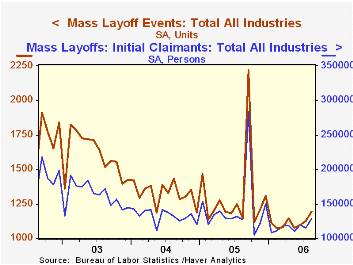 Global| Sep 21 2006
Global| Sep 21 2006Mass Layoffs Up
by:Tom Moeller
|in:Economy in Brief
Summary
In August, the number of mass layoff events rose for the third consecutive month. The 6.0% m/m increase pulled the y/y comparison positive for the first time since December. During the last ten years there has been a (negative) 85% [...]

In August, the number of mass layoff events rose for the third consecutive month. The 6.0% m/m increase pulled the y/y comparison positive for the first time since December.
During the last ten years there has been a (negative) 85% correlation between the three month average level of layoff announcements and the y/y change in payroll employment.
The number of persons affected last month by mass layoffs surged 11.4% m/m but were up just 0.3% y/y. The number of persons affected by mass layoffs during the first eight months of this year fell 12.6% from the first eight months of 2005.
Increased layoffs in manufacturing (21.2% y/y) and information (-35.0% y/y) dominated the increase in claimants for unemployment insurance last month. Declines elsewhere were widespread.
The Mass Layoff Statistics (MLS) program collects reports on mass layoff actions that result in workers being separated from their jobs. Monthly mass layoff numbers are from establishments which have at least 50 initial claims for unemployment insurance (UI) filed against them during a 5-week period.
| Mass Layoffs | August | July | Y/Y | 2005 | 2004 | 2003 |
|---|---|---|---|---|---|---|
| All US Industries (# Events, SA) | 1,193 | 1,125 | 4.2% | 15,699 | 15,926 | 19,220 |
| Total (# Persons, SA) | 127,944 | 114,895 | 0.3% | 1,722,452 | 1,591,081 | 1,946,548 |
Tom Moeller
AuthorMore in Author Profile »Prior to joining Haver Analytics in 2000, Mr. Moeller worked as the Economist at Chancellor Capital Management from 1985 to 1999. There, he developed comprehensive economic forecasts and interpreted economic data for equity and fixed income portfolio managers. Also at Chancellor, Mr. Moeller worked as an equity analyst and was responsible for researching and rating companies in the economically sensitive automobile and housing industries for investment in Chancellor’s equity portfolio. Prior to joining Chancellor, Mr. Moeller was an Economist at Citibank from 1979 to 1984. He also analyzed pricing behavior in the metals industry for the Council on Wage and Price Stability in Washington, D.C. In 1999, Mr. Moeller received the award for most accurate forecast from the Forecasters' Club of New York. From 1990 to 1992 he was President of the New York Association for Business Economists. Mr. Moeller earned an M.B.A. in Finance from Fordham University, where he graduated in 1987. He holds a Bachelor of Arts in Economics from George Washington University.
More Economy in Brief
 Global| Feb 05 2026
Global| Feb 05 2026Charts of the Week: Balanced Policy, Resilient Data and AI Narratives
by:Andrew Cates






